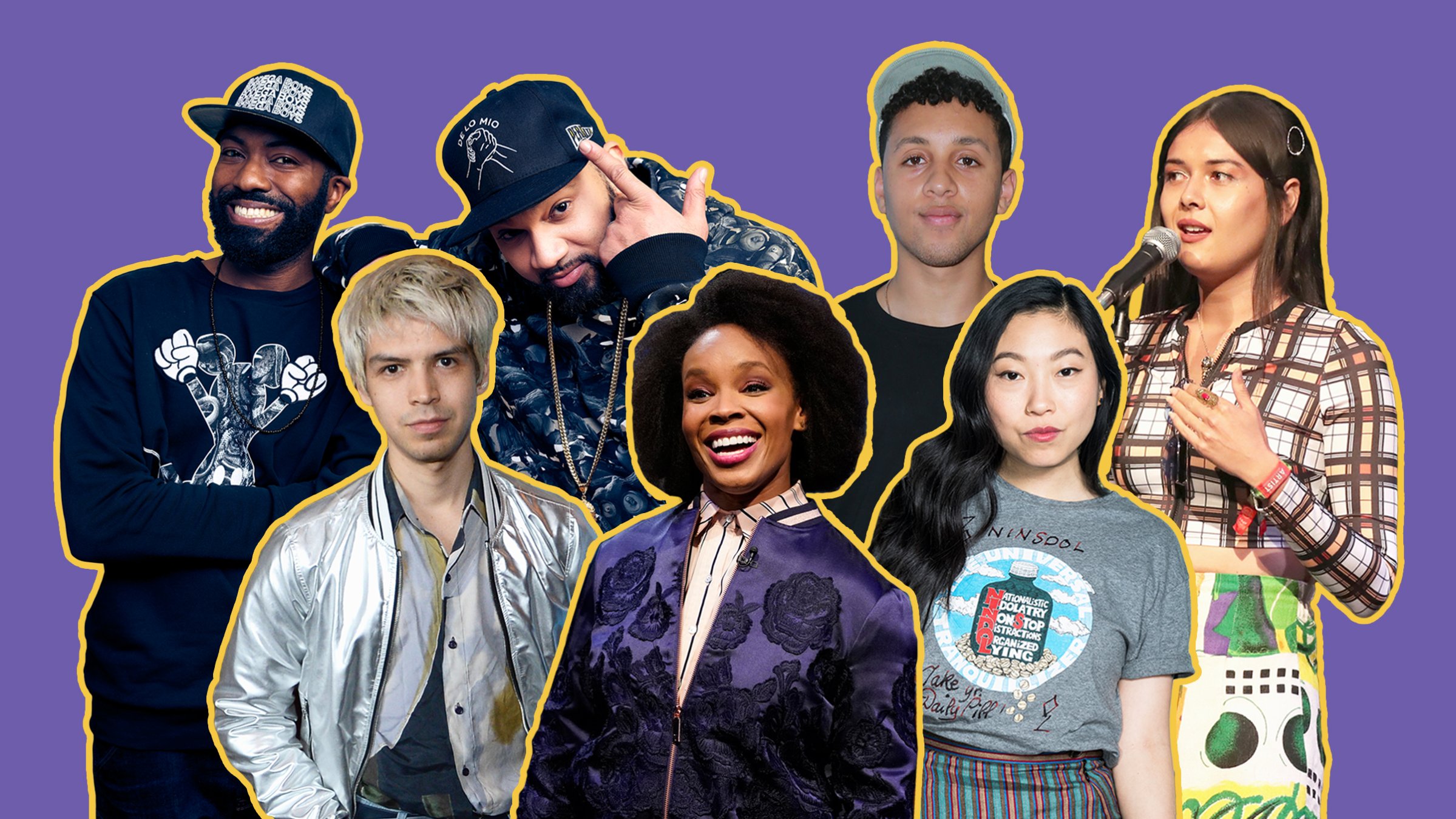
A new class of writers, performers and creators is redefining comedy—rejecting tired tropes and carving out space for fresh perspectives. From millennial social-media stars who’ve brought their internet fluency into traditional television writing rooms to stand-ups pushing the boundaries of the form, these comedians working across North America are shaping what it means to be funny in 2019.
Demi Adejuyigbe
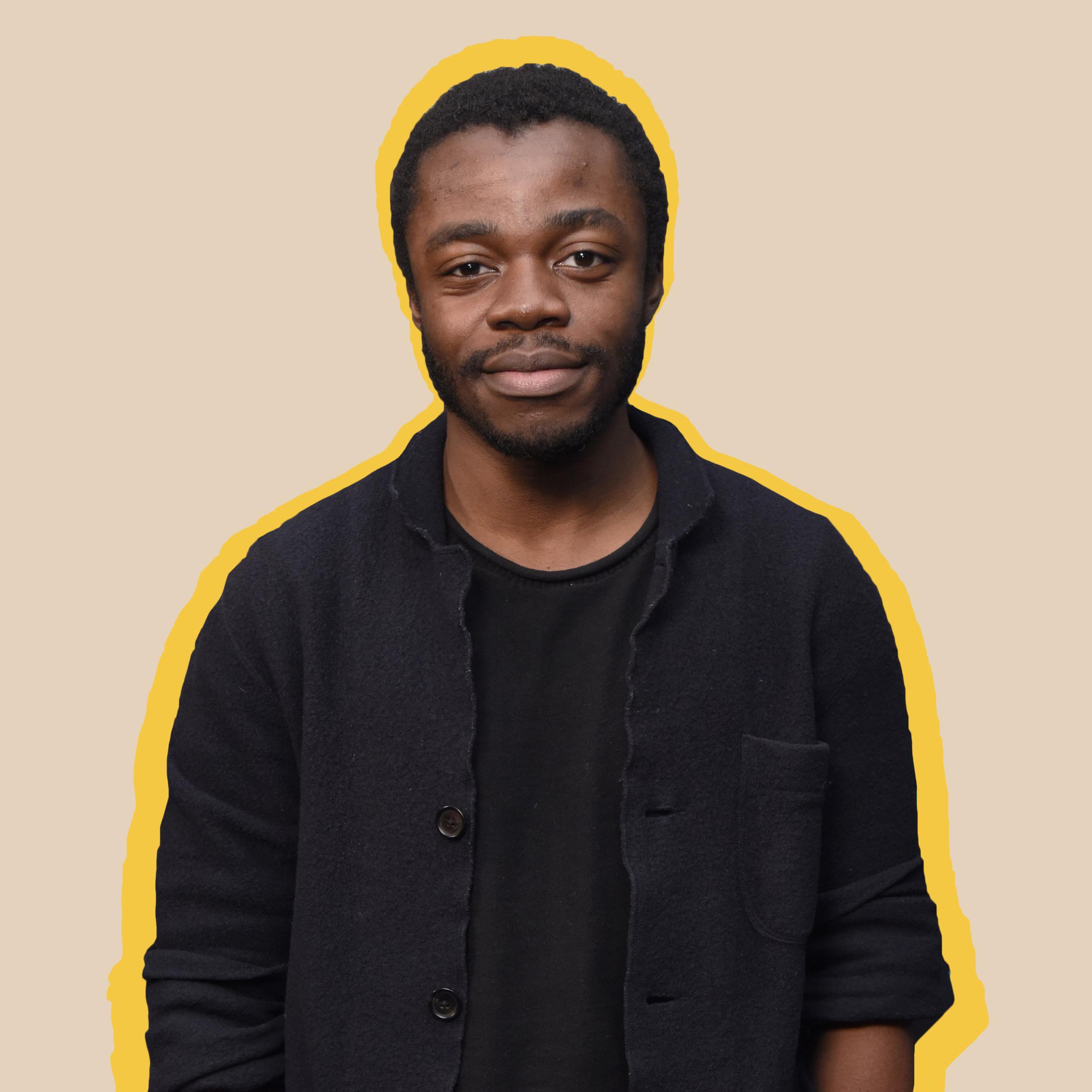
Demi Adejuyigbe knows, with laser-like precision, what the internet thinks is funny. Like many young comics, Adejuyigbe has built a following with clever tweets, viral videos (like his annual dances celebrating the song “September”) and hit podcasts like Gilmore Guys. But what distinguishes Adejuyigbe is that he’s so musically gifted — he’s been dubbed the “Weird Al” of his generation for his exceptional ability to write a parody song, whether it’s a sobering version of “It Wasn’t Me” on his comedy podcast Punch Up the Jam that he co-hosts with Miel Bredouw or the Ready Player One theme song that never was. (Though his most masterful work yet may be a series of movie credit songs rapped by “Will Smith.”) He’s leveraged his knack for offbeat comedy into writing jobs on The Late Late Show With James Corden and NBC’s critical darling, The Good Place — all while establishing himself as one of his generation’s most talented synthesizers of popular culture. —Eliana Dockterman
Megan Amram
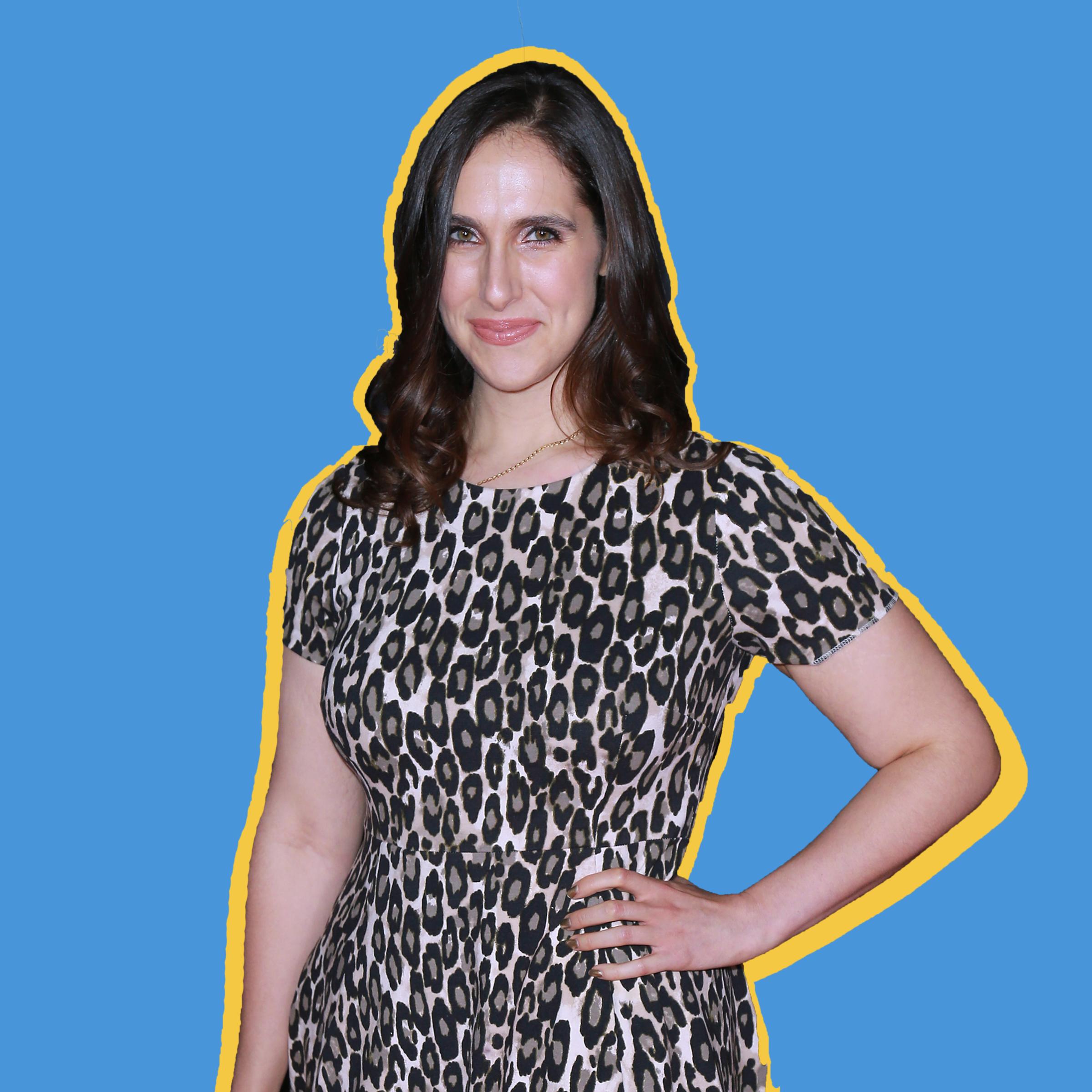
For almost two years, Amram has tweeted the same thing every day: “Today was the day Donald trump finally became president.” It’s a clever meta take on the endless handwringing that goes on in the turbulent news cycle that surrounds the 45th president, and a good use of her platform: Amram was one of the first high-profile Twitter personalities to leverage her online humor into big writing jobs. Politics aren’t Amram’s only focus; she has written for TV shows like The Simpsons, Parks and Recreation and The Good Place, where she draws from a seemingly endless well of food puns for gags on the show. Amram has also distinguished herself among her comedy peers with a steadfast commitment to a bit that took her all the way to the Emmy Awards. Last year, Amram campaigned to win an Emmy through a series called An Emmy for Megan, in which she met the bare-minimum requirements to be nominated in the Outstanding Actress in a Short Form Comedy or Drama Series category. Her campaign was successful insofar as she got two nominations. Although she didn’t win, Amram showed that putting enough out there to qualify can get you pretty far. She’s promised to try again with a second season. Next time, the campaign will be all about revenge. —Mahita Gajanan
Awkwafina
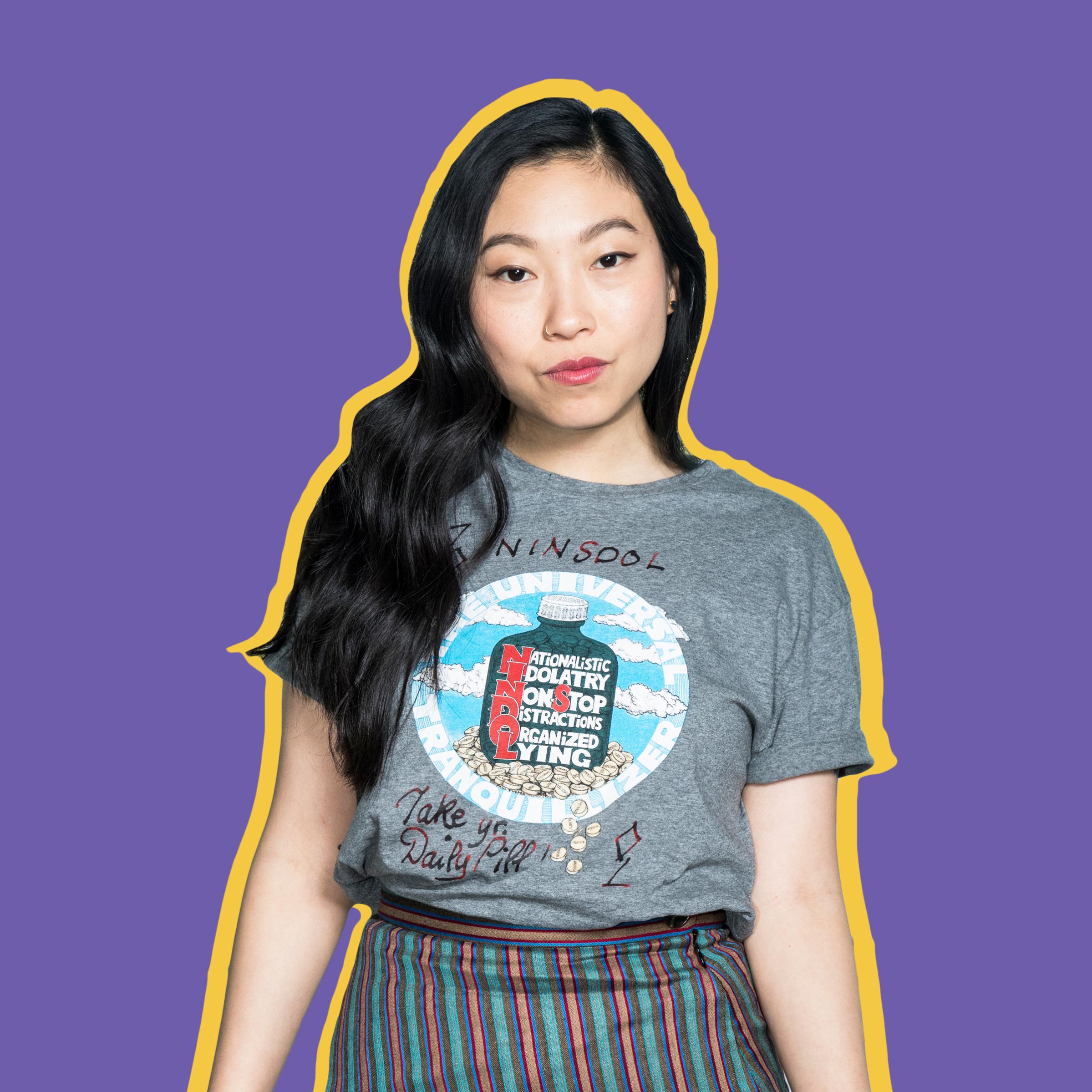
In the past year, Nora Lum—better known to her fans as the comedian and rapper Awkwafina—has gone from a viral YouTube personality to a breakout presence on the big screen, thanks to hilarious scene-stealing turns in two summer blockbusters, Crazy Rich Asians and Ocean’s 8. Lum, who launched her career as an entertainer with a side-splitting, explicit rap about her nether regions titled “My Vag,” brings the same gregarious presence that she had as a YouTuber to her career in Hollywood. Lum’s enlivened characters that could have been flattened into stereotypes with her crackerjack energy. This big time moment isn’t lost on her; while hosting Saturday Night Live last October, she noted the significance of what it meant for her to be the first Asian-American woman to host the show in 18 years, since Lucy Liu in 2000. Newly minted movie stars don’t come much better than this one. —Cady Lang
Desus + Mero
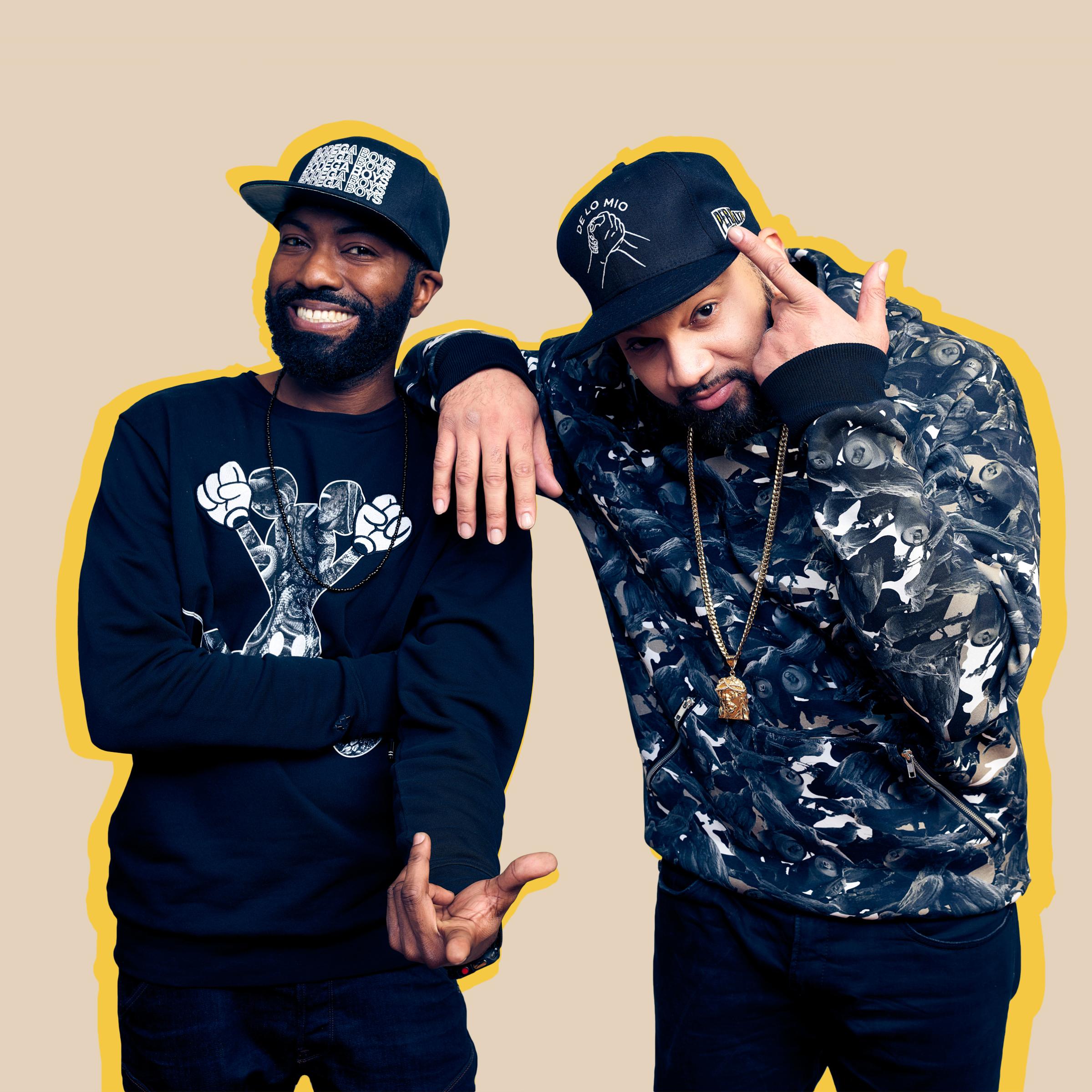
Freewheeling, inexhaustible and disorderly: No one captures the spirit of New York City quite like Desus Nice (legal name Daniel Baker) and the Kid Mero (Joel Martinez), the self-proclaimed “Bodega Boys” who began sharing their rapid-fire, rambling dialogue on a podcast in 2013. They have since graduated to hosting talk shows on Viceland and now Showtime — where they debuted Desus & Mero in February. Many talk-show hosts strain to stay on the edge of pop culture, but Desus, 37, and Mero, 35, have the firsthand knowledge and wit to capture cultural trends as they break, reveling in the chaos of the moment. And while they’re right in their wheelhouse taking on rap beefs, sneakers and their beloved Knicks, Desus and Mero are equally comfortable interviewing fellow Bronx native and Congresswoman Alexandria Ocasio-Cortez about the marginal tax rate. The original podcast was recorded off the cuff, but the new show features a writers’ room, improved graphics and skits (like a scathing parody of the Oscar-winning film Green Book, about an interracial friendship in the ’60s). But the pair’s spitballed rapport — and their Bronx pride — remain at the core of everything they do. “If we get a lot of complaints about, we ‘talk too fast,’ we’re ‘too Bronx-y,’ that means we’re scaring the Showtime audience and we’re doing our thing,” Desus says. “We’re trying to bring our piece of the Bronx to the Showtime audience and bring Showtime to the Bronx.” —Andrew R. Chow
Cole Escola
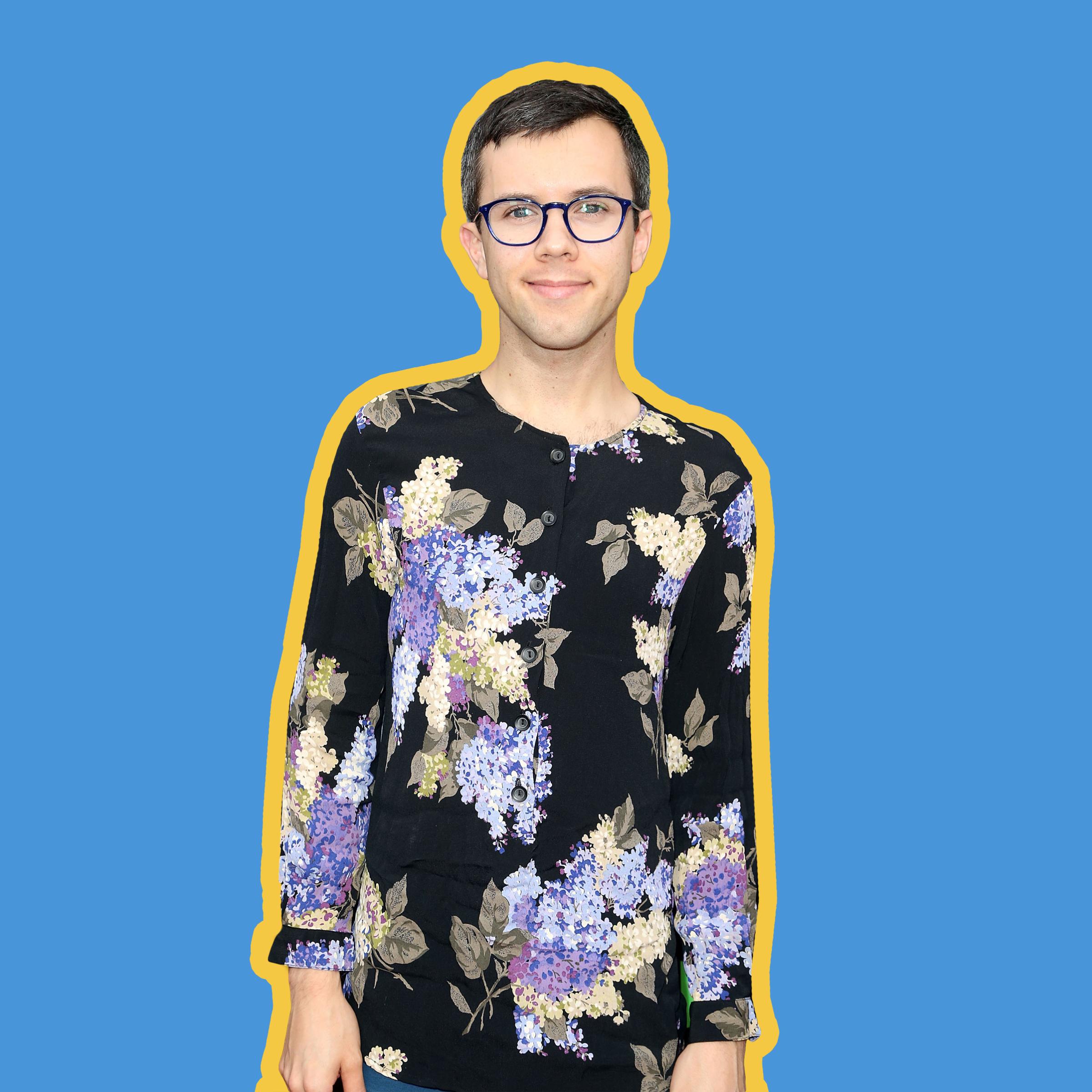
If Cole Escola were a character actress, he’d be a fine one. Instead, as he once told Time Out, he is “a character actress trapped in the body of a teenage boy.” This juxtaposition is only part of what makes the 32-year-old comedian, actor and writer — a fixture of New York City’s alt-cabaret scene for the last decade — a singular voice in comedy. Escola, whose website bio begins, “trailer trash born and raised in rural Oregon,” is a master of character work, embodying a cadre of familiar, mostly-female archetypes (an eyewitness on local news, a botox-laden TV host) with a keen eye for detail before ratcheting them up into the realm of the absurd. In one video, he plays a pitch-perfect “mom from an orange juice commercial” sporting a no-fuss bob, who, after learning how much sugar the leading brand of orange juice contains, gets mixed up in dogfighting and a double homicide. Though he’s at home onstage, selling out repeat performances of his 2017 solo show before taking it on the road last fall, Escola is bringing his modern camp sensibility to the masses this year as a writer and actor on At Home With Amy Sedaris and a producer on Comedy Central’s The Other Two. He’s making cabaret a little weirder, and comedy a little more cabaret, one wig at a time. —Eliza Berman
Maya Erskine + Anna Konkle

Maya Erskine and Anna Konkle bring some of the most cringe-worthy moments of the adolescent experience into the spotlight along with a healthy dose of Y2K-era nostalgia in their new Hulu comedy, Pen15. The 31-year-old co-stars and co-creators play fictionalized versions of themselves at age 13, tackling periods, shaving and other coming-of-age “firsts” with a physicality and humor that make reliving the dreaded middle school experience both hilarious and cathartic. “We find the humor in trauma,” Erskine says. “I’ve always been someone who has laughed when you’re not supposed to laugh,” Konkle adds. But above all, their comedy sticks simply because it’s so convincing: The way the duo handle 13-year-old Maya discovering masturbation for the first time is rendered with an authenticity that’s unlike anything else on TV, and it’s won them acclaim from critics and fans alike. “There are moments where our humor is irreverent,” says Erskine, “but it comes from a grounded place.” —Rebecca Katzman
Sean Evans
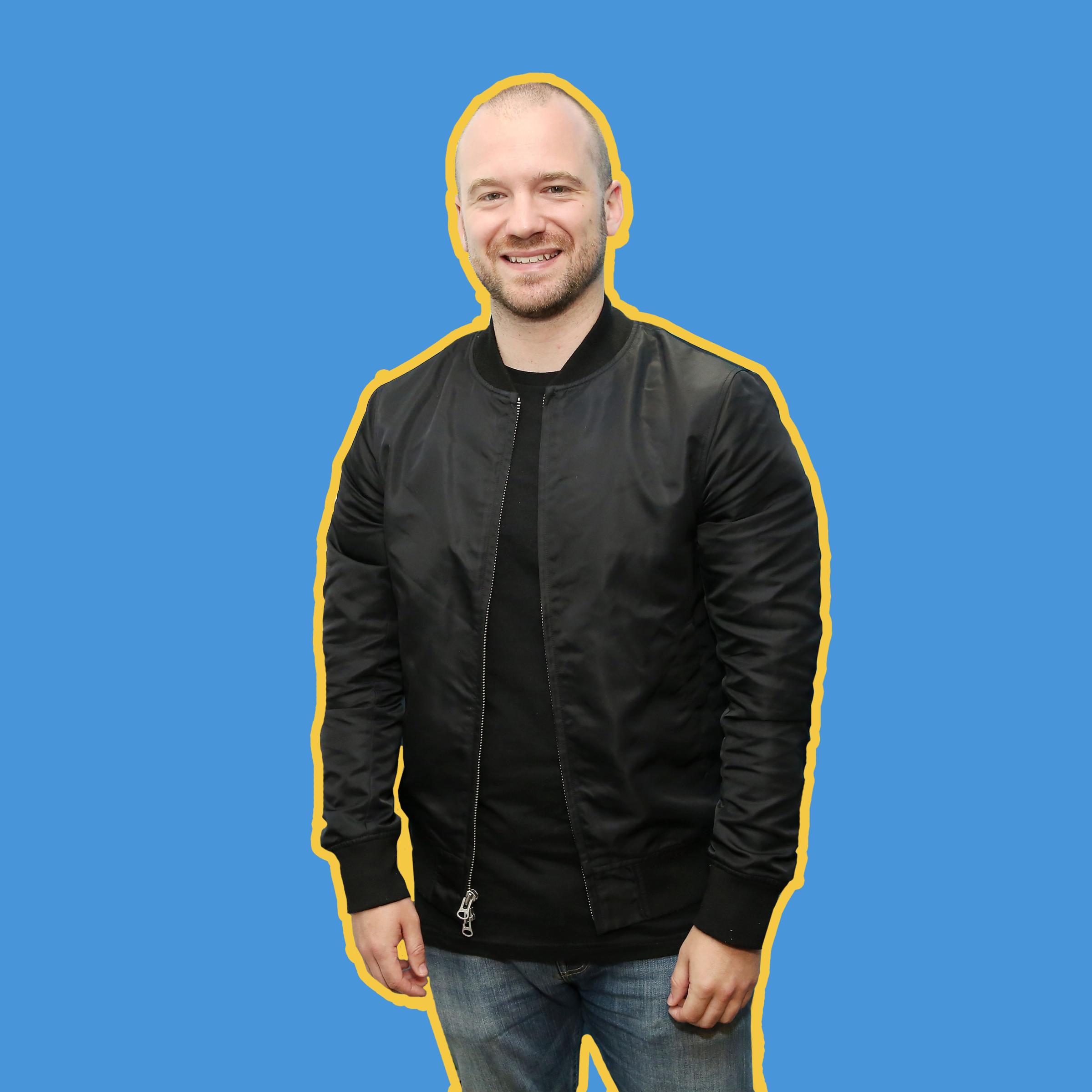
At first glance, Sean Evans’ YouTube talk show “Hot Ones” seems like pure, gleeful sadism. Evans gets his famous guests, many of them comedians including Kevin Hart and Key & Peele and stars like Charlize Theron, to eat 10 increasingly spicy chicken wings, calmly grilling them about obscure parts of their life and career as they melt into blistering pools of sweat. But Evans, a 32-year-old producer for Complex Magazine, eats the wings too, making the conversations not one-sided torture but instead hilarious exercises in empathy, honesty and growth. His off-the-cuff charm and carefully researched questions ensure that his guests are willing to loosen up, embrace the pain and broach topics they might not normally touch like when he gave Theron a Rorschach test. His format has paved the way for primetime talk show hosts, from Stephen Colbert with his “personal space” box to James Corden and his “Fill Your Guts or Spill Your Guts” segment, to stage their own set pieces in which public discomfort and humiliation are the conduit to humor, and eventually, catharsis. —Andrew R. Chow
Hannah Gadsby
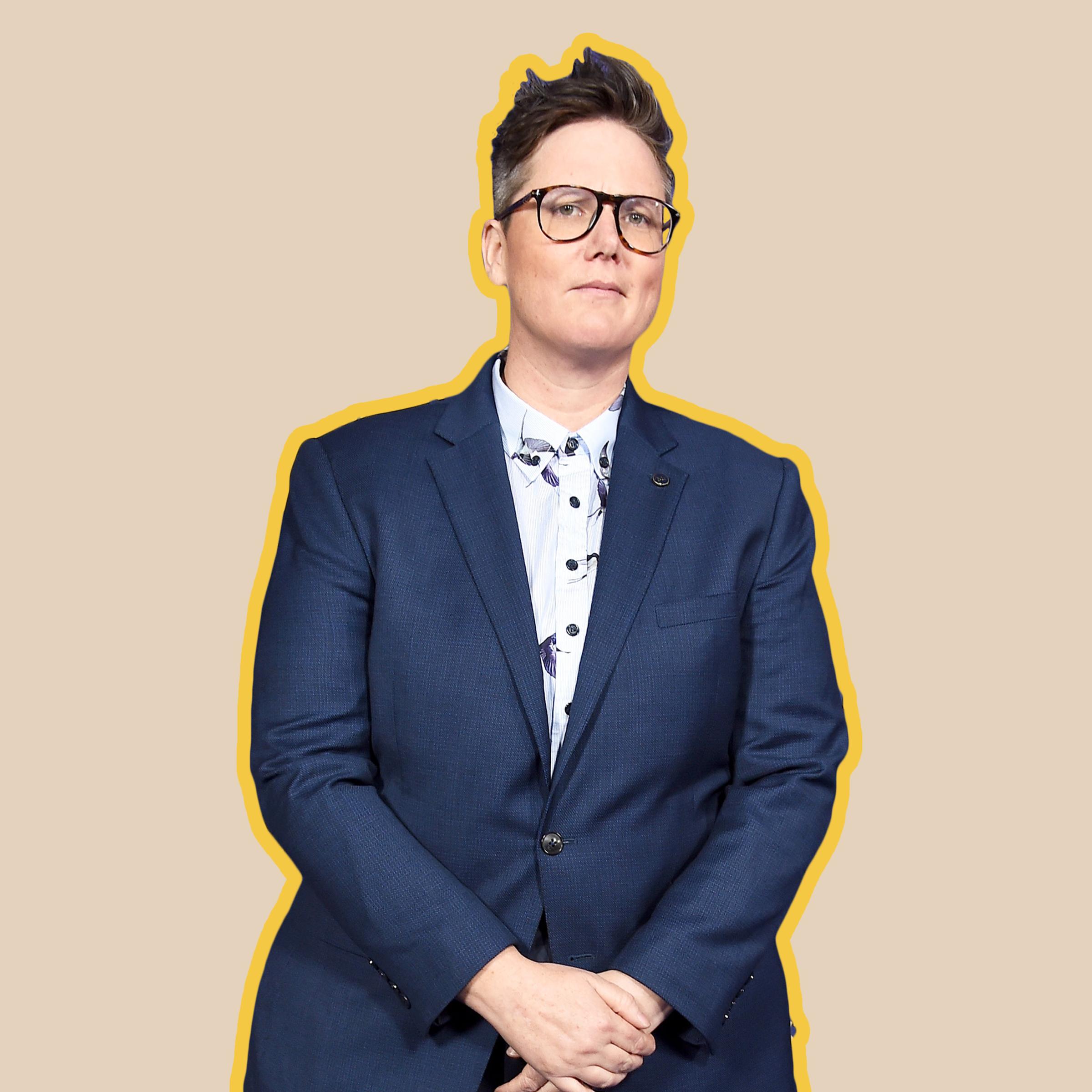
In her acclaimed 2018 stand-up special Nanette, Hannah Gadsby argues that making jokes at the expense of anyone, herself included, can force marginalized people to take part in their own degradation. Gadsby should know. She’s a lesbian who hails from Tasmania, where the majority of citizens believe that homosexuality should be a crime, and has made a career of joking about the emotional and physical abuse she has suffered. But in Nanette, Gadsby, a master of the form, returned to those stories, and this time, forced the audience to live through her pain. Fueled by #MeToo fury, she bent the format to her will and made room for righteous rage in comedy. Part-standup, part-TED Talk, part-protest, Nanette tapped a raw nerve at the perfect moment and bravely expanded what stand-up could be. The special shot Gadsby to superstardom, and though she vowed to quit comedy within it, she will begin a world tour in March with a new, highly-anticipated stand-up special named after her dog, Douglas. She’s calling herself a “hypocrite.” Comedy fans are grateful. —Eliana Dockterman
Patti Harrison
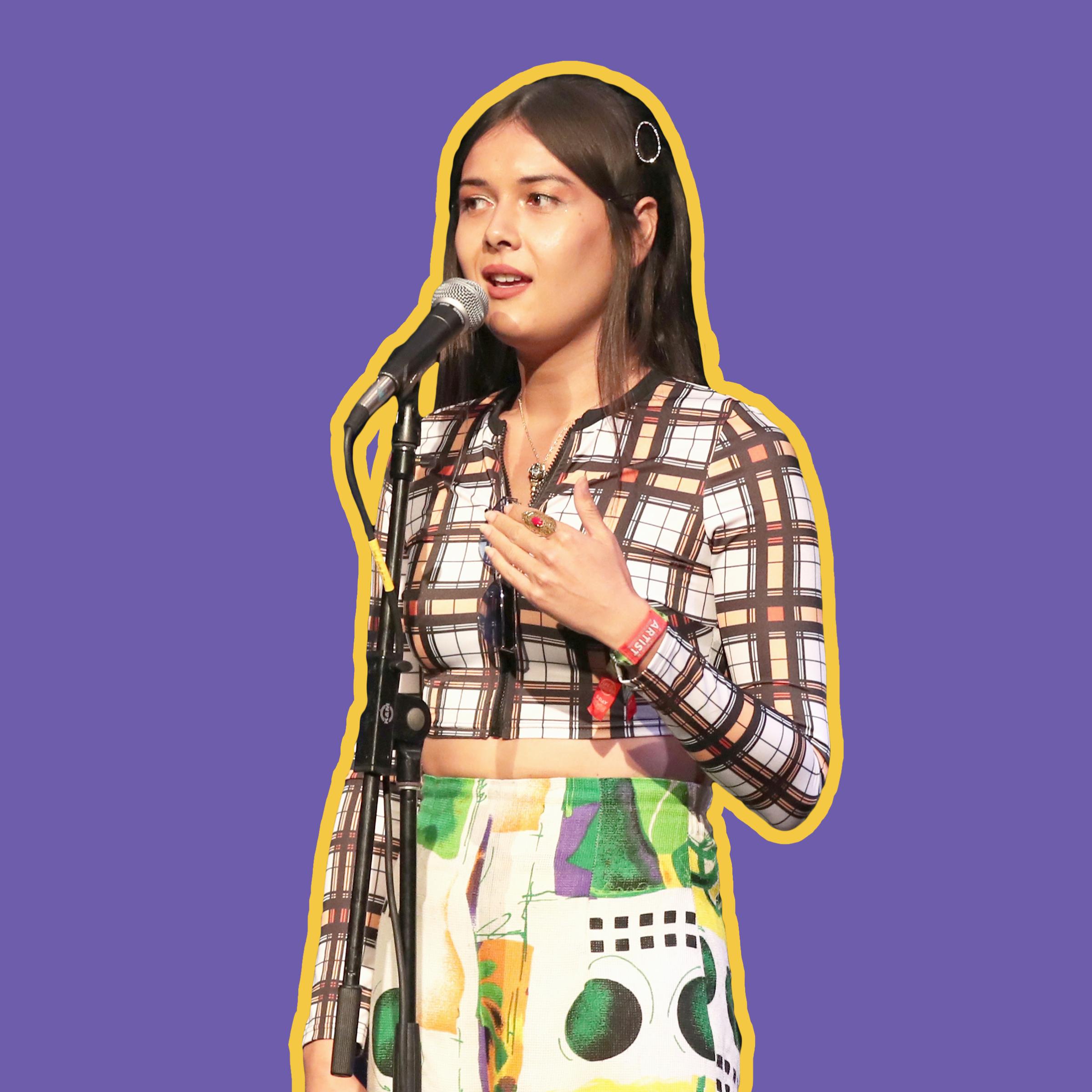
Harrison is known for taking absurdist humor to new heights, whether she’s reviewing exotic animals on YouTube or tweeting self-consciously vulgar jokes. As a part-Vietnamese trans woman, she’s used to having a spotlight on her identity: “It’s sensationalized, and I benefit from that,” she says. In 2017, for example, she went on The Tonight Show Starring Jimmy Fallon to monologue about President Trump’s anti-trans tweets; the clip went viral and landed her a recurring spot on the show. Since then, she’s become a regular on the Hulu comedy Shrill and in the writers’ room of the gross-out Netflix comedy Big Mouth. Yet Harrison, 26, is most proud of her self-described “dumb” humor, like when she pitches terrible fake TV shows. (Like Son Boss, a sitcom about a boss who promotes his infant son so many times that the baby becomes the father’s boss.) “Being an ambassador is important,” she says, “but if people want to listen to my political takes, they also have to listen to jokes about me murdering birds.” —Eliana Dockterman
Dan Levy
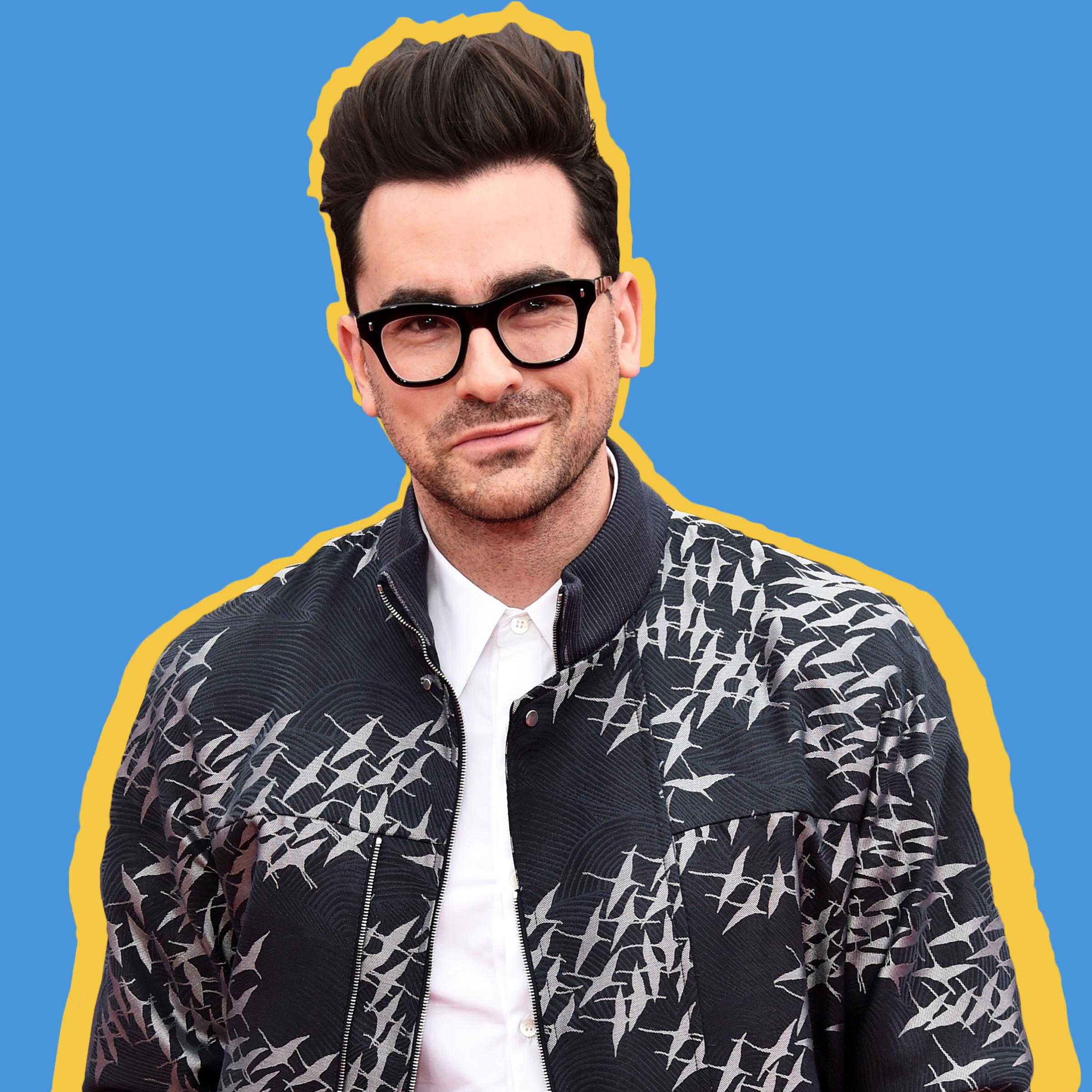
Canadian sitcom Schitt’s Creek arrived on America’s obscure Pop TV in 2015 with a premise as silly as its name: After losing everything, a super-rich family must move to the titular small town, which they bought as a joke in the ’90s. Five seasons later, it’s a cult hit stateside, thanks to a vocal fanbase, Netflix word-of-mouth and its leads, comedy legends Eugene Levy and Catherine O’Hara. The cast has even been touring North America with a night of behind-the-scenes stories, music and a Schitt’s Creek trivia challenge. But the credit for the show’s warmth belongs mostly to Eugene’s 35-year-old son and co-creator Dan, who multitasks as showrunner, writer and star. His character, David — a mopey pansexual whose love life forms the show’s sweetest arc — is a fan favorite, embodying a casual fluidity that is true to millennial ideas about identity. Dan brings that same reflexive inclusivity to each episode, crafting a show whose sensibility is contemporary even as its kindness feels like the best kind of throwback. —Judy Berman
Hasan Minhaj
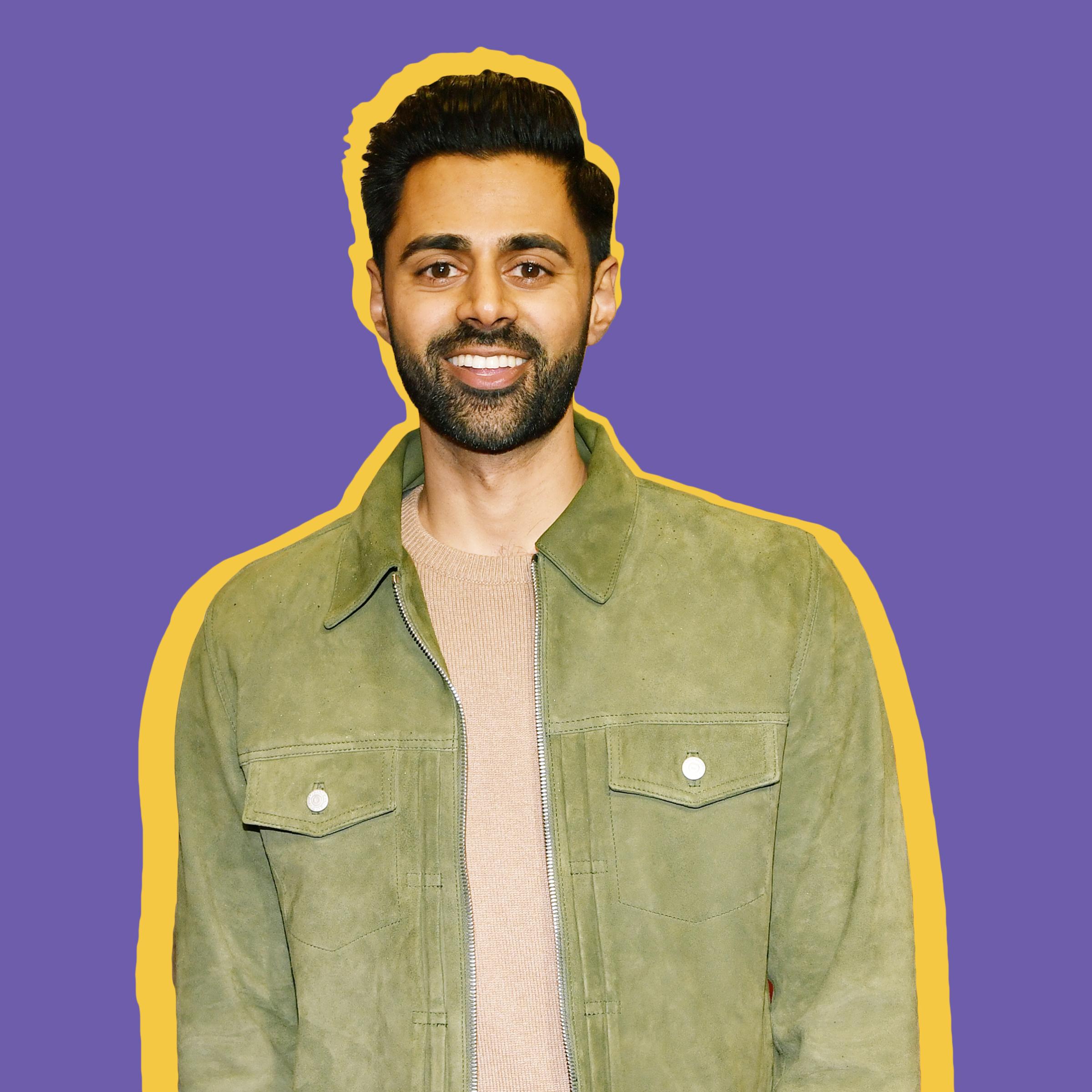
Hasan Minhaj looks out from the title sequence of his Netflix talk show Patriot Act, a blend of old school stand-up and internet comedy, with a perfected look of disbelief: eyes wide, brows mischievously furrowed and mouth slightly agape. He makes this face often during Patriot Act while confronting bewildering, unjust or inane issues making news across the world — from American dependence on oil and social media-incited violence to his own censorship in Saudi Arabia. Minhaj, 33, burrows deep into complicated topics with patience and rigor, making them relatable by bringing in pop culture references like when he used the Franco brothers as a jumping-off analogy to explain the three branches of ICE. And he fully embraces his unique position of being a rare Asian-American person with such a significant platform in media, whether weaving Hindi into his monologues or bringing attention to the Facebook group and global phenomenon Subtle Asian Traits. —Andrew R. Chow
Beth Newell + Sarah Pappalardo
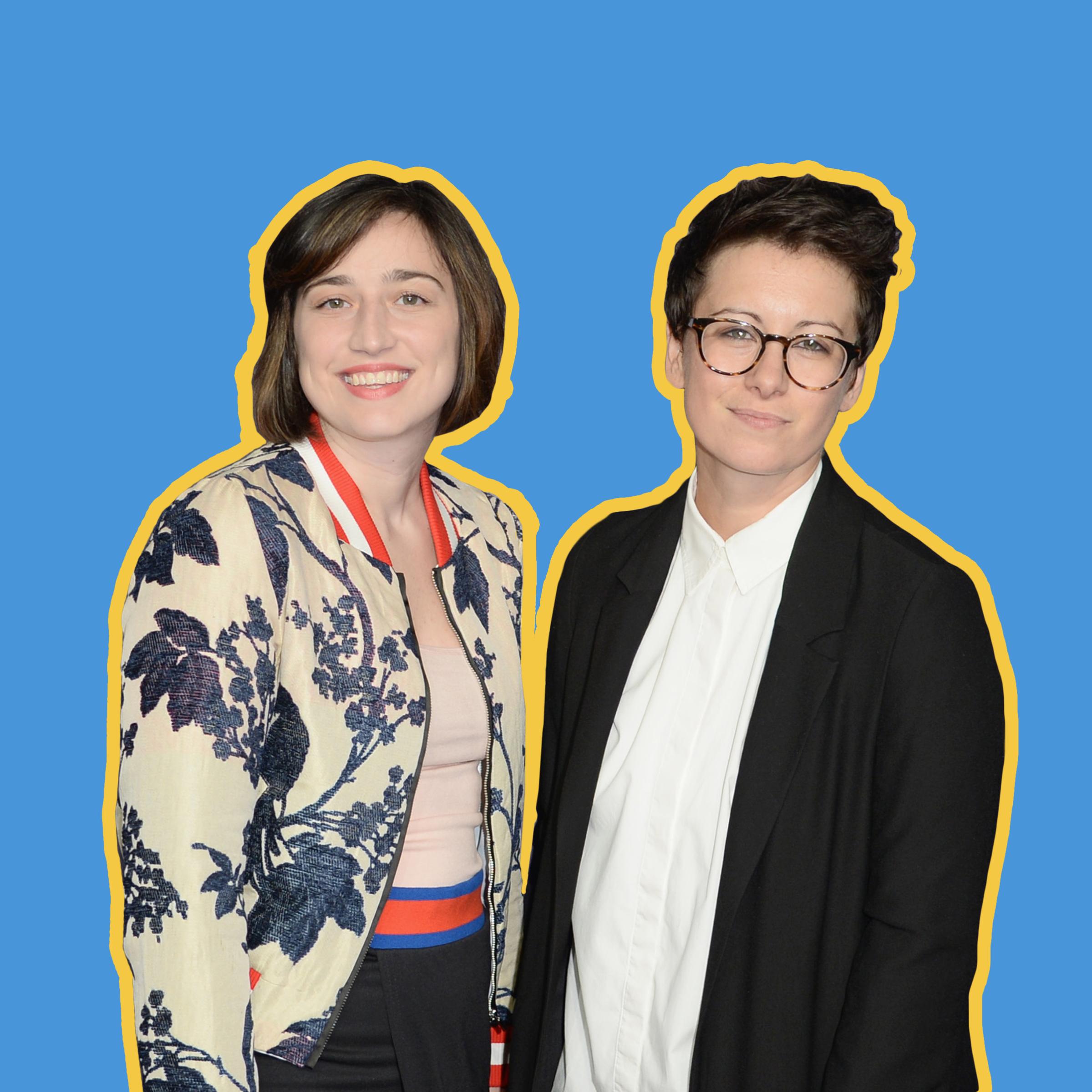
Satirical news has gotten really specific: There’s punk parody The Hard Times, The Onion’s BuzzFeed spoof ClickHole and other ideas that got old fast. One that didn’t is Reductress, the faux women’s site that comedians Beth Newell and Sarah Pappalardo launched in 2013. Capturing the dissonance inherent in the mix of beauty tips, clickbait and woke posturing that suffuses gendered media, they offer a daily stream of loopy headlines, from “Wow! This Woman Stood Up to Gender Norms by Naming Her Son ‘Vagina’” to “Creator of Rape in America Documentary Talks About Hair Care.” As Newell explained to Vulture, the humor differentiates between “things [that] are actually empowering versus how empowerment is represented in the media as ‘slap on this face cream.’” With podcasts, events, a book and an upcoming Comedy Central project, Newell and Pappalardo have built that anti-consumerist ethos into an empire. —Judy Berman
Joe Pera

When Joe Pera speaks, his soft voice trembles and his posture is slightly stooped. He casts his eyes toward the floor like a boy too nervous to make eye contact with his crush. It’s a shtick, but it may just be the gentlest, most unassuming one in comedy today. To picture the Buffalo-born comedian at work, imagine Mr. Rogers at the stand-up mic, only blonder and younger (Pera’s website has a feature that allows visitors to guess his age, but it’s certainly much, much younger than the persona from which he rarely breaks). His Adult Swim show Joe Pera Talks With You — an outgrowth of his specials Joe Pera Talks You to Sleep and Joe Pera Helps You Find the Perfect Christmas Tree — debuted in 2018 to a reception as warm as the grandfatherly Michigan middle-school choir teacher he plays. In the show, he channels heartrending earnestness while taking on topics big (like the collapse of society) and small (like pancakes). On why he dislikes dominoes, for example: “It’s one of my core beliefs that you shouldn’t waste kinetic energy.” In a stand-up bit on why the low-ranked Bills are the best team in football: Their unwatchable-ness reminds us that “maybe, just maybe, it’s time take the kids on a drive to the lake again.” At a time when small-town America is sometimes dismissed as backwards and parochial, Pera’s depiction is neither mocking nor reductive. And as social discourse is increasingly characterized by callousness and cruelty, Pera makes a quiet—and quietly funny—case for decency. —Eliza Berman
Amber Ruffin
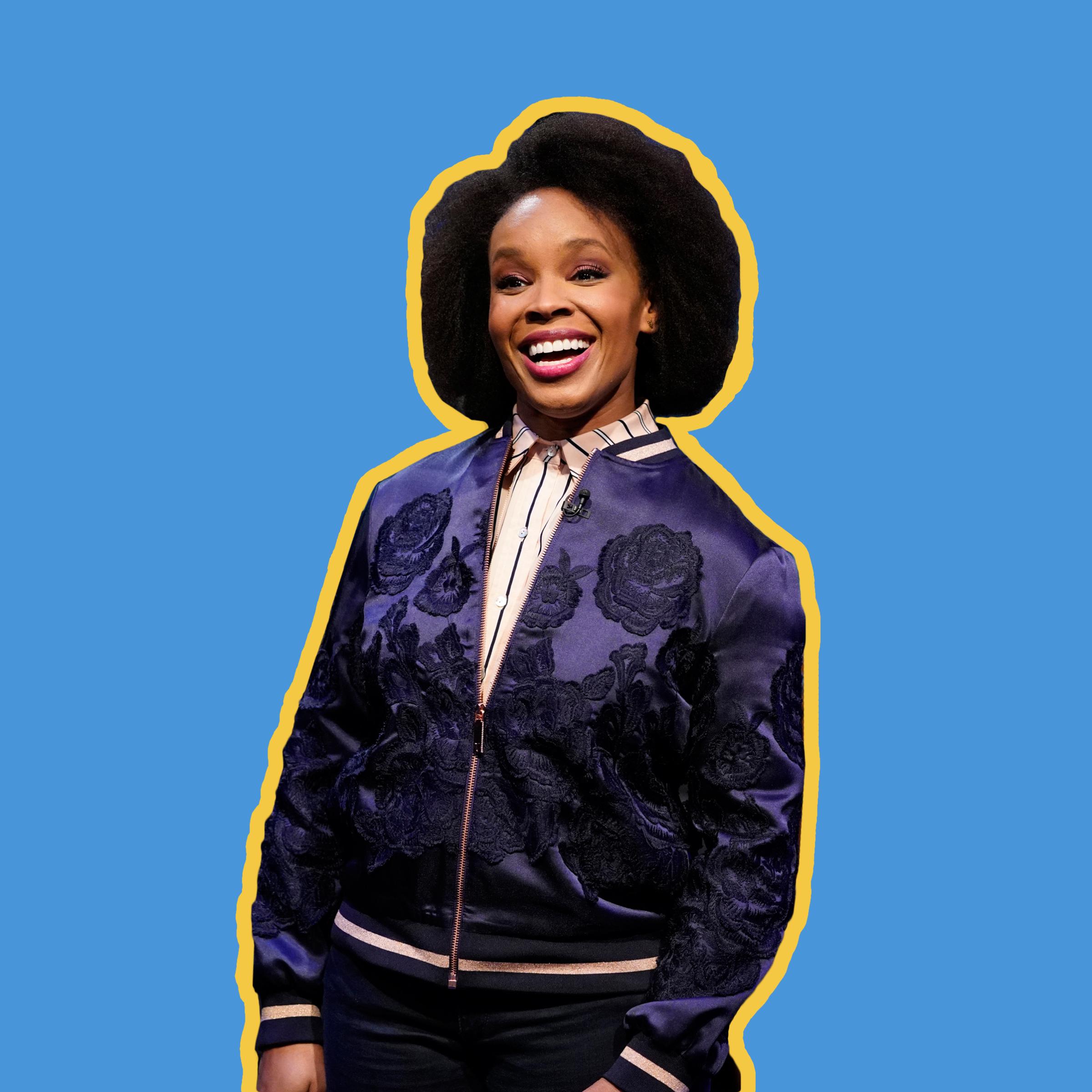
Amber Ruffin made history as a pioneering black woman in late night in 2014, when an SNL audition landed her a surprise job offer from Seth Meyers. Since then, the Drunk History stalwart and former writer for Comedy Central’s uproarious-but-canceled Detroiters has also become a breakout star in front of the Late Night camera. Fueled by a unique mix of absurdist humor, sharp cultural criticism and exuberant, rapid-fire delivery, Ruffin’s topical monologues respond to controversies from Roseanne to R. Kelly (“This fool is skippin’ around freer than a lady in a tampon commercial”) in a way that takes issues of identity and social justice seriously without detracting from the zany fun of a nighttime talk show. “I cannot believe people are down for the amount of silliness that I’m putting on display,” the comedian told WPR, “and I cannot believe that they will let us talk about such touchy, important, scary issues.” In fact, NBC is clamoring for more of Ruffin’s sensibility; the network recently ordered a pilot presentation of Village Gazette, a comedy series about a small-town newspaper that she will star in as well as create. —Judy Berman
Julio Torres
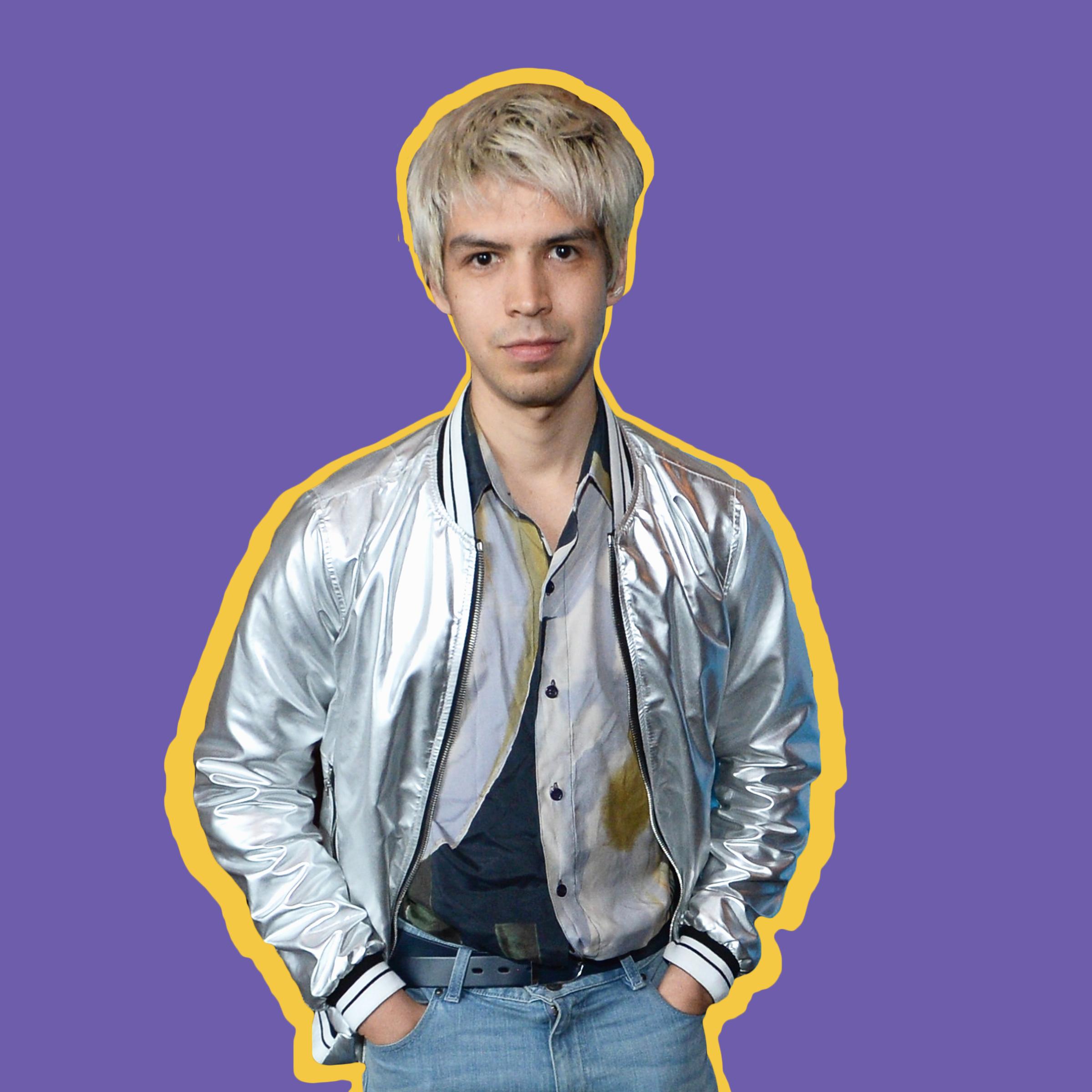
In his year and a half writing for SNL, Torres, 32, has garnered acclaim for sketches unlike anything seen on the show before. From “Wells for Boys” — a viral satirical ad for toy wells made for sensitive kids to gaze into — to a sketch poking fun at the logo design for the movie Avatar, Torres has a knack for highlighting the mundane and finding surreal humor in it. “I saw a sink and just thought about it for months, and it ended up being a sketch,” Torres says. “Little things stay with me.” As a performer, the Salvadoran immigrant—set to star in the upcoming HBO series Los Espookys, which he co-wrote—is known for his “removed alien” delivery, which he attributes to growing up outside of the U.S. “It’s informed by how I feel literally foreign sometimes,” he says. “It’s like taking that removal that was there to begin with—Oh, I don’t necessarily belong in this country or this open mic—and magnifying that gap.” —Wilder Davies
Jonathan Van Ness
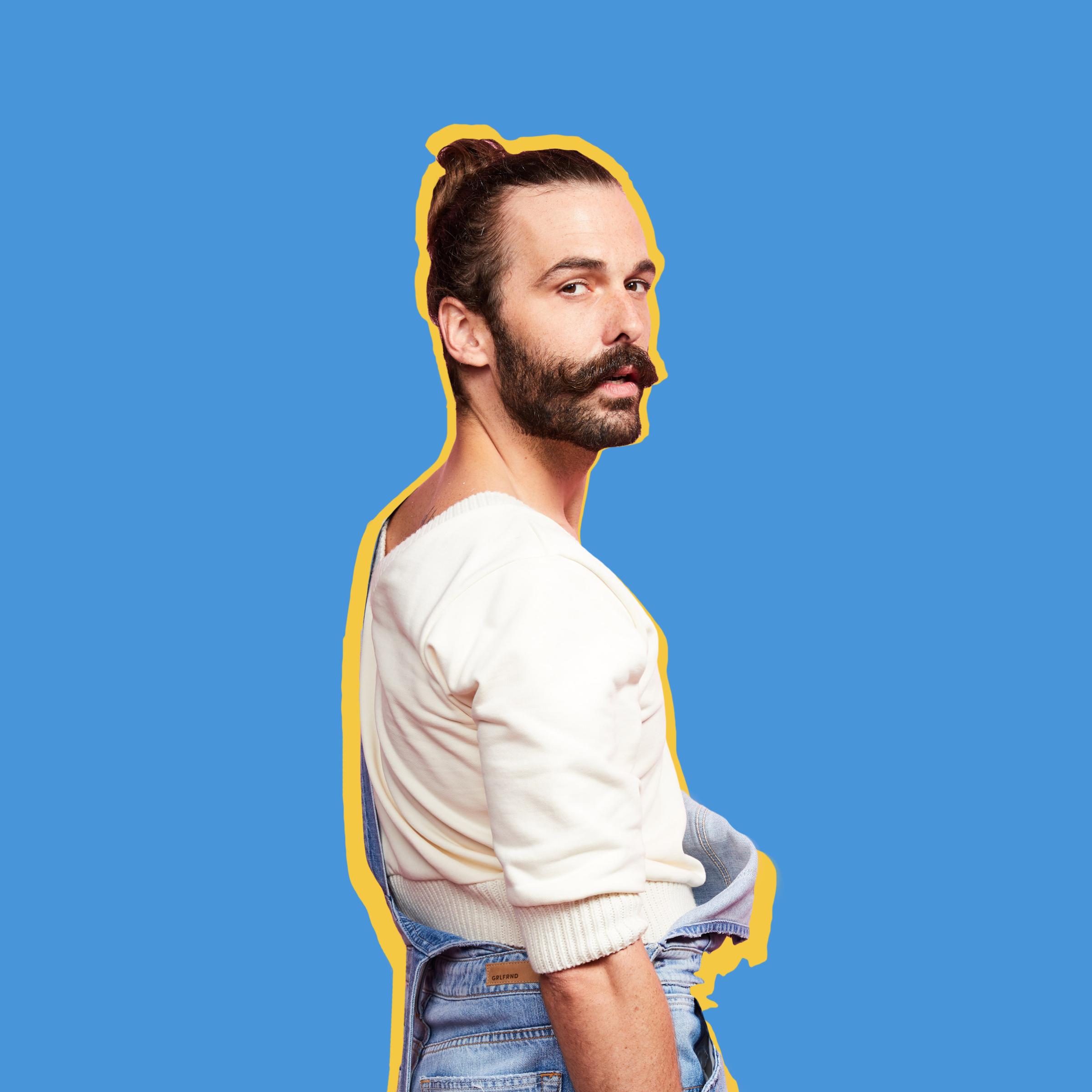
As a hairdresser, Van Ness’ job is to help people look their best. But as the grooming expert on Netflix’s rebooted Queer Eye, he’s committed to making people feel their best, too. The series, which launches a third season on Netflix March 15, is the perfect showcase for how he uses his sense of humor like being obsessed with pomade and encouraging the show’s subjects to embrace their inner Kelly Clarkson to gently educate people on a variety of issues, including LGBTQ acceptance and opening up to self-love. Van Ness’ infectious charisma and mission to help people live the most authentic versions of their lives is a part of everything he does; Van Ness, 31, is also an amateur ice skater, social media star, podcaster and burgeoning stand-up comedian. But for Van Ness, who grew up gay in rural America, comedy has also long been a form of self-preservation. “I think my ability to joke and laugh about things is because I’m forced to,” he told Vulture last year. “I’ve been through a lot of things in my life that if I didn’t make light of it, I would literally keel over.” —Mahita Gajanan
Ali Wong
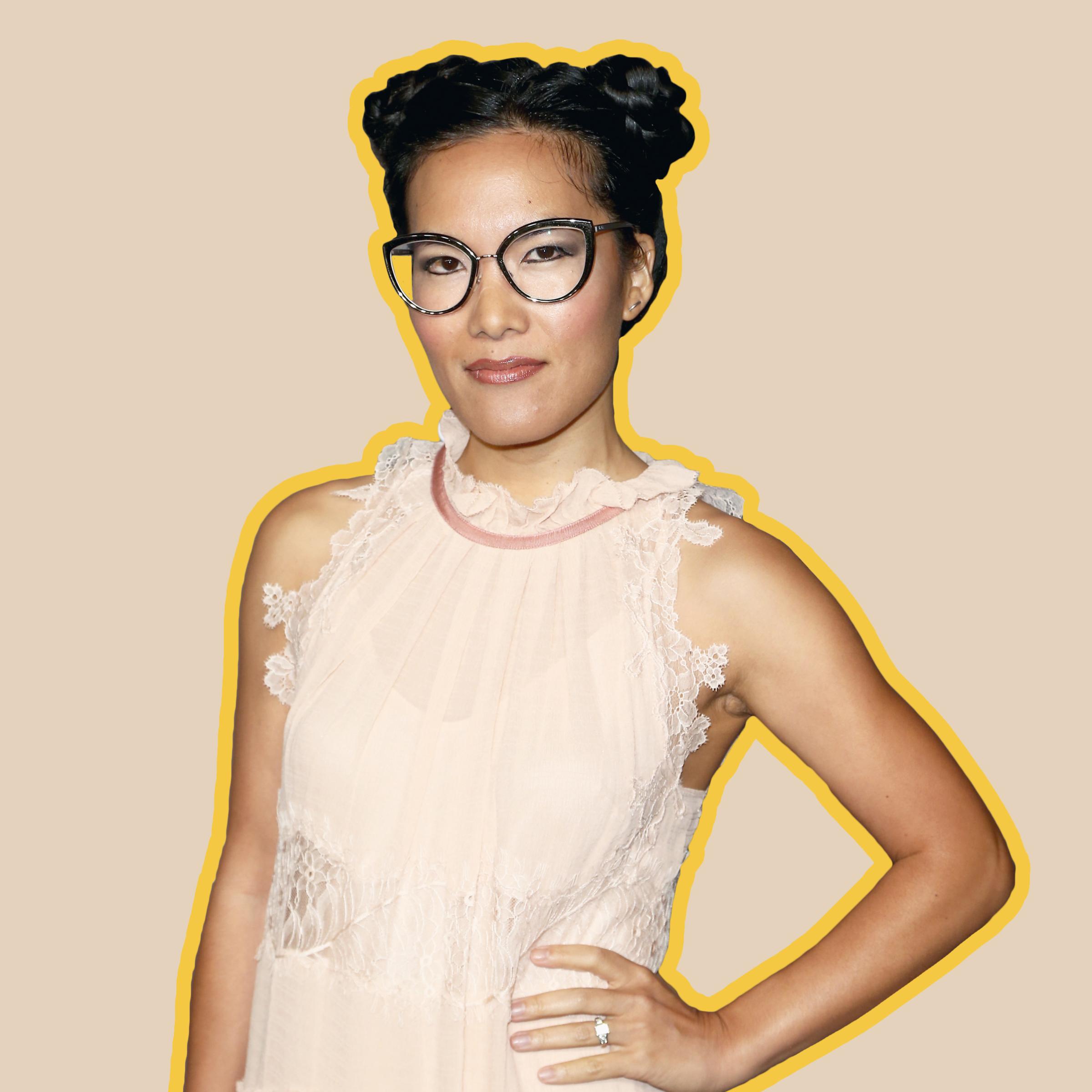
“I tried being a stay-at-home mom for eight weeks. I like the stay-at-home part. Not too crazy about the mom aspect. That sh-t is relentless.” That’s a very pregnant Ali Wong wisecracking in the opener to her second Netflix special, 2018’s Hard Knock Wife, and it captures the essence of what’s made Wong, a longtime stand-up comic and TV writer, such a superstar. Raunchy, expletive-laden jokes used to be the domain of bros, but Wong turns her scabrous voice on subjects like miscarriages, gender disparity in the workplace and the unexpected trials of motherhood, slyly subverting viewer expectations. Even the simple act of her performing while so pregnant during her two blockbuster specials (the first was Baby Cobra in 2016) was a radical act. With a romantic comedy, an animated series and a memoir all slated for upcoming release, expect Wong’s world to continue growing. —Cady Lang
Bowen Yang
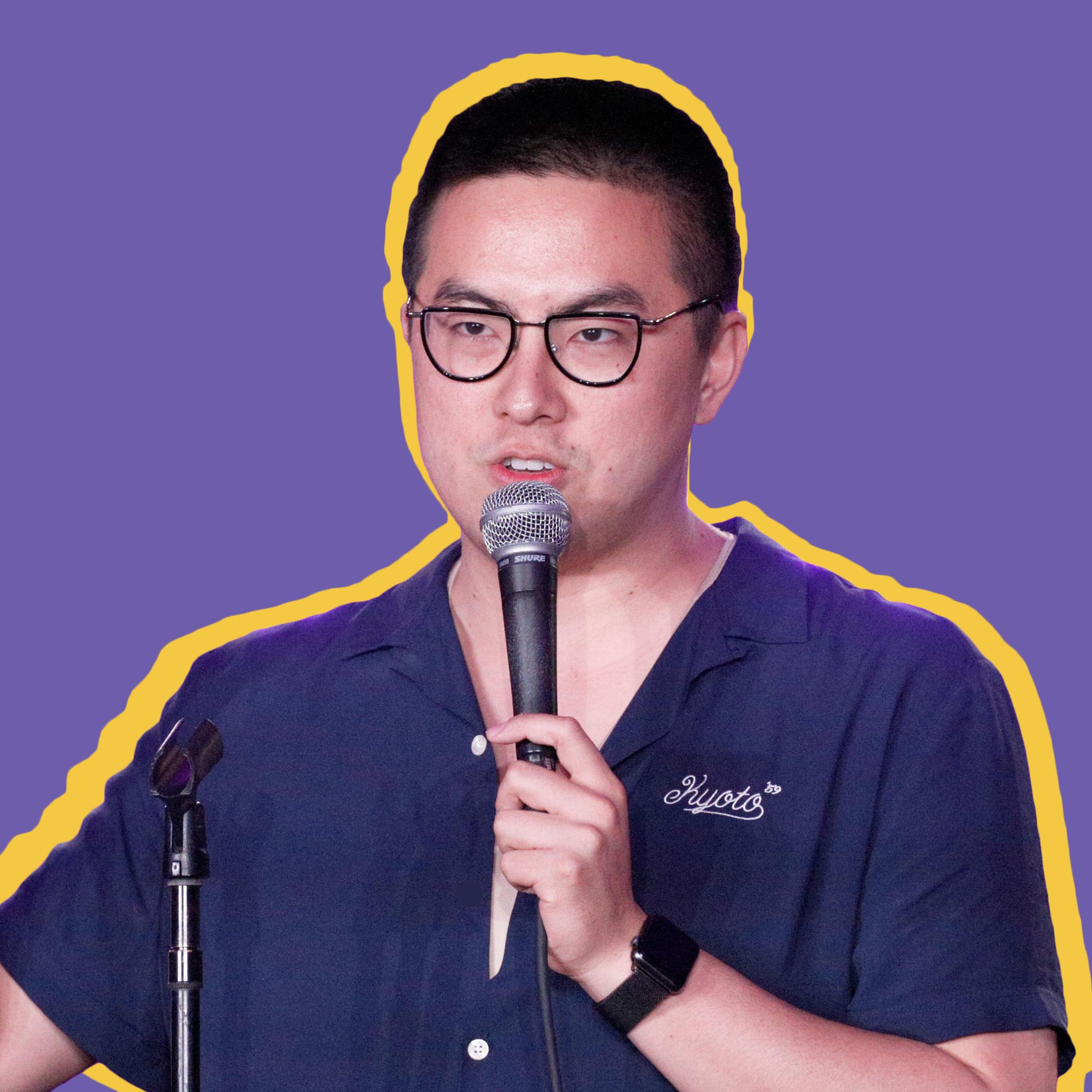
As a writer for SNL and a co-host of the hit comedy podcast Las Culturistas, Bowen Yang already has several high-profile stages where he can express himself. Yet he flies highest when he’s taking the most memorable pop culture moments of the last few decades and transforming them into viral art with ingenious lip-sync videos of himself. Watch how perfectly he captures Meryl Streep’s Miranda Priestly dressing down her assistant in a speech about the color cerulean in The Devil Wears Prada, or Tyra Banks yelling “We were all rooting for you!” on America’s Next Top Model. And when his humor is more pointed — as on Twitter, where he can somehow put conversion therapy and the need for an in-unit washing machine into one joke — it’s in service of a worthy cause. “Maybe my presence alone is political, but being satisfied with that feels simplistic,” Yang, 28, told Out in January. “For anyone who’s concerned with developing a comedic voice, starting with a point of view is the first step. Might as well make it a helpful one, binch.” —Mahita Gajanan
Jaboukie Young-White
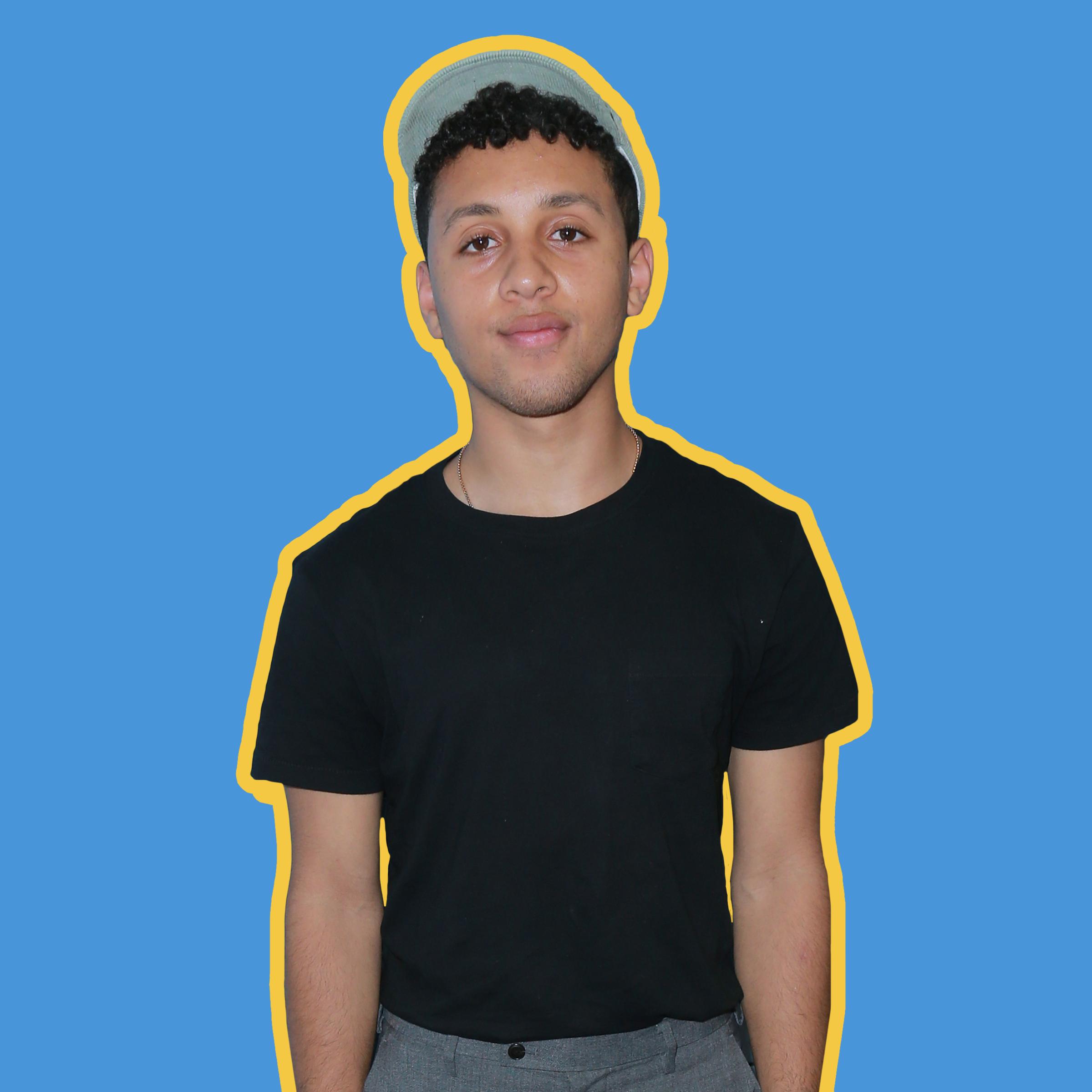
“Millennial culture is fantasizing about all the medical procedures you’ll get once you have health insurance.” So tweets stand-up, social-media aficionado and recently hired Daily Show correspondent Young-White, 24, who’s at the forefront of a new set reimagining what’s funny for the younger generation. After years on Twitter, Young-White has built up a “reservoir of opinions” that he turns to when coming up with material for stand-up or TV. “The news can by very cyclical. The same issues are coming up over and over and over again,” he says. “I go through my tweets while writing and be like, ‘Oh, this has staying power and is still relevant.’” Operating at the intersection points of his own identity — as a gay millennial of Jamaican descent coming of age in an era when things feel pretty grim — as well as the universal humor of meme culture, Young-White bucks the sensibilities that defined the humor he grew up with in the mid-’00s, when raunchy bros dominated pop culture and comedy everywhere. Instead of jokes about, say, “losing your virginity to a hot teacher,” his material plays off the anxieties that plague young people now: the onset of climate change, massive student loan debt, taking drugs (prescribed or otherwise) and the sources of casual racism and homophobia are all points of inspiration. “There’s a lot of times when I just want to scream into the void,” Young-White says. “But I might have a photo that puts a spin on it. That’s me following that scream and making a meme out of it.” —Mahita Gajanan
Maysoon Zayid
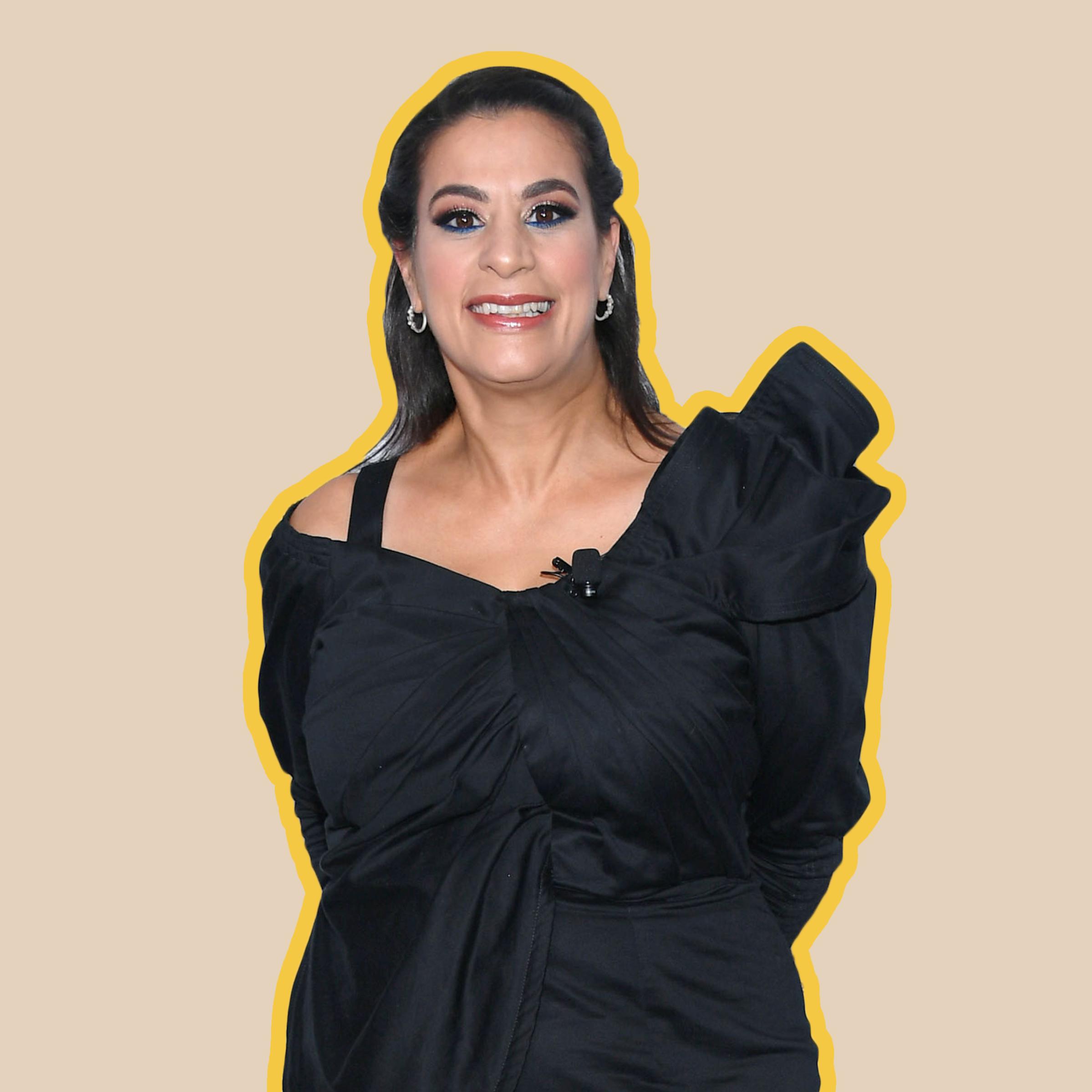
Maysoon Zayid likes to call herself a “sit-down stand-up” comic. She has cerebral palsy, which requires her to stay seated as she delivers witty jokes about her own shaky condition: “I’m like Shakira Shakira meets Muhammad Ali.” She pairs self-deprecation with a fierce dedication toward increasing representation on the comedy stage on three fronts: as a disabled person, as a Muslim-American and as a woman. Zayid co-founded the New York Arab-American Comedy Festival in 2003 after public perception of Muslims soured after Sept. 11 (the festival celebrated its 15th year to packed houses in October). She then went viral in 2013 during a TED Talk, in which she talked about losing roles of disabled characters to able-bodied actors. But her biggest and most vital act is yet to come: she will write and star in an autobiographical sitcom about her life, which is in development at ABC. —Andrew R. Chow
More Must-Reads from TIME
- Donald Trump Is TIME's 2024 Person of the Year
- Why We Chose Trump as Person of the Year
- Is Intermittent Fasting Good or Bad for You?
- The 100 Must-Read Books of 2024
- The 20 Best Christmas TV Episodes
- Column: If Optimism Feels Ridiculous Now, Try Hope
- The Future of Climate Action Is Trade Policy
- Merle Bombardieri Is Helping People Make the Baby Decision
Contact us at letters@time.com